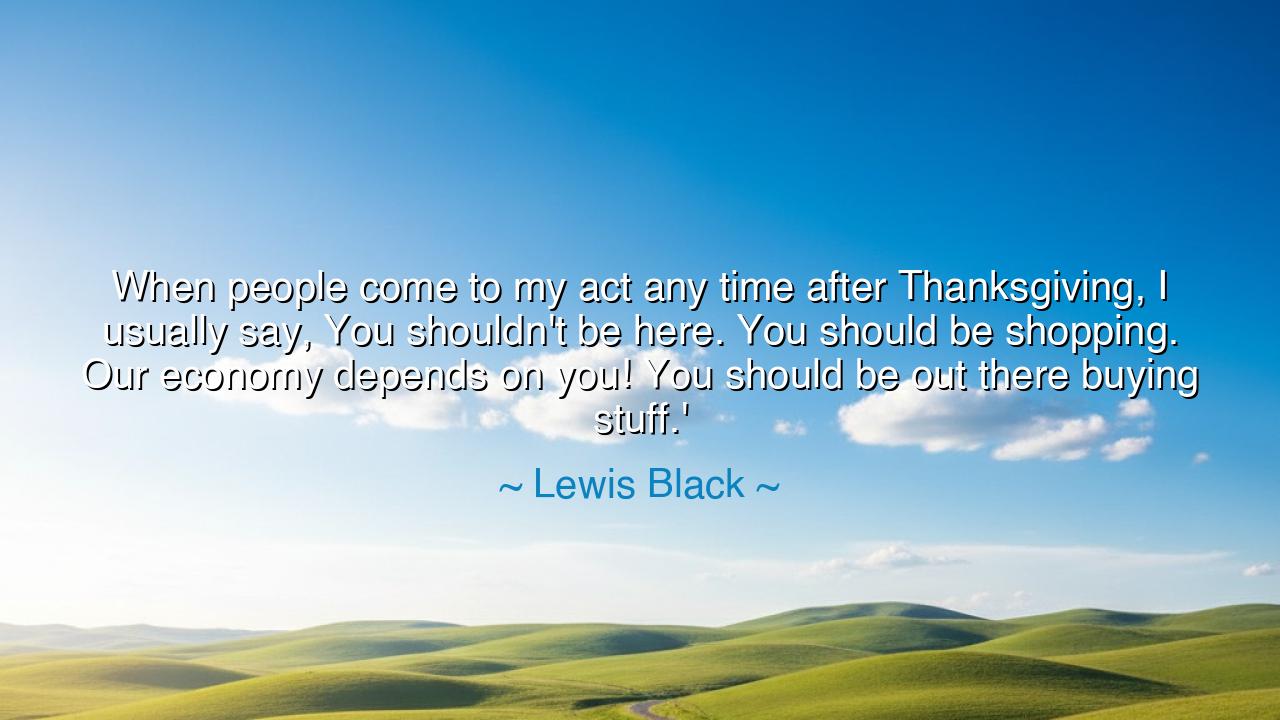
When people come to my act any time after Thanksgiving, I
When people come to my act any time after Thanksgiving, I usually say, You shouldn't be here. You should be shopping. Our economy depends on you! You should be out there buying stuff.'






"When people come to my act any time after Thanksgiving, I usually say, You shouldn't be here. You should be shopping. Our economy depends on you! You should be out there buying stuff." With this sharp and satirical remark, Lewis Black reveals both the absurdity and the urgency of a culture bound to consumption. His humor is not only meant to stir laughter, but also to provoke reflection on the strange transformation of Thanksgiving, where a day once rooted in gratitude now spills into a frenzy of commerce. In his jest, we hear a truth: that society has yoked its survival to the endless cycle of buying and selling.
The origin of this critique lies in the rise of what we now call Black Friday, the day after Thanksgiving, when businesses ignite a storm of sales and shoppers pour into stores. It has become a ritual of its own, one that overshadows the stillness of gratitude with the roar of economic engines. Lewis Black, in his characteristic way, takes this cultural truth and hurls it back at his audience with biting irony: "You shouldn’t be at my comedy show—you should be worshipping at the altar of consumption." His sarcasm lays bare the values we have allowed to take root.
History itself offers us examples of such cultural shifts. In ancient Rome, the festivals of Saturnalia began as days of gift-giving and feasting, honoring the god of time and harvest. Yet over centuries, Saturnalia became less about reverence and more about extravagance and excess. What began as gratitude devolved into indulgence. So too in our age has Thanksgiving, once devoted to the spirit of thanks, been overshadowed by the drive to purchase, as though the measure of gratitude were found not in prayers but in receipts.
Yet within his jest lies a deeper challenge. When Black says, “Our economy depends on you!” he is pointing to the uncomfortable reality that nations and markets are indeed sustained by consumer spending. It is both a truth and a tragedy: a people who should be resting in family and reflection are urged instead into restless striving, as though the health of the whole depends not on virtue, but on shopping carts filled to the brim. His comedy awakens us to this paradox, urging us to laugh—and then to question.
But this is not a call to despair. For laughter itself is a weapon, one that cuts through hypocrisy and awakens hearts to a better way. Black’s humor shows us that once we recognize the absurdity of our situation, we are free to imagine alternatives. We need not reject commerce entirely, for trade and exchange have always been part of human flourishing. But we must place them in their rightful place, beneath gratitude, generosity, and the deeper wealth of human connection.
The lesson for future generations is clear: do not allow the spirit of Thanksgiving to be consumed by the spirit of consumption. Let the feast of gratitude come first, and let buying and selling serve life, not rule it. Remember that economies rise and fall, but the strength of a people lies not in their shopping but in their character. Teach children that abundance is not only what is purchased, but what is shared freely, with no price tag at all.
Practical action flows naturally: keep sacred the day of thanks. Resist the pull to rush immediately into stores or online sales. Instead, extend the spirit of gratitude into acts of generosity—sharing meals, offering kindness, giving time. If you must buy, buy wisely, and let your purchases reflect true values, not blind impulse. Above all, let laughter, gratitude, and community remain the center, and let the economy be servant, not master.
Thus, Lewis Black’s joke, though wrapped in laughter, carries the weight of prophecy. A society that forgets gratitude for the sake of consumption forgets its soul. Yet through humor and reflection, we are reminded that we have a choice: to live as mere consumers, or to live as grateful beings who let commerce serve life, and not the other way around.






AAdministratorAdministrator
Welcome, honored guests. Please leave a comment, we will respond soon